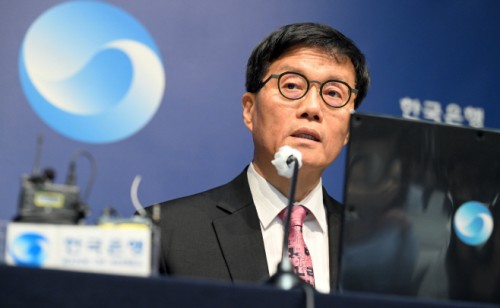 |
| Bank of Korea Governor Rhee Chang-yong speaks during a press conference following a Monetary Policy Board meeting at the Bank of Korea headquarters in Jung-gu, Seoul, on May 29. / Source: Yonhap News |
The Bank of Korea (BOK) on May 29 lowered its benchmark interest rate by 25 basis points, from 2.75 percent to 2.5 percent. This marks the fourth rate cut since last October and brings the rate down to its lowest level since August 2022 — a span of two years and nine months.
The decision comes amid growing concerns over the economy, after the BOK sharply downgraded its growth forecast for this year from 1.5 percent to 0.8 percent. The bank cited weakening domestic demand, particularly in the construction sector, as a key driver of the slowdown. The construction industry, which accounts for roughly 14 percent of GDP, has fallen into a prolonged slump, dragging down growth by an estimated 0.4 percentage points.
Adding further pressure, U.S. tariff hikes targeting China and other major trading partners are clouding Korea’s export outlook. If additional tariffs are imposed on key export items such as semiconductors and pharmaceuticals, the BOK projects that GDP growth could slow to 0.7 percent this year and 1.2 percent next year.
"In a context of stable inflation, our policy focus is on easing downward pressures on the economy," BOK Governor Rhee Chang-yong said at a press conference. "While certain risks — including household debt and volatility in the foreign exchange market — remain, supporting economic recovery is now the priority."
Markets are now watching for the possibility of further rate cuts within the year. If the downturn deepens, some expect the benchmark rate could fall to 2 percent by year’s end. In fact, four out of six members of the Monetary Policy Board reportedly supported the likelihood of additional cuts, while two favored holding rates steady.
Experts view this rate cut as a pivotal response to mounting recession concerns. Rather than addressing inflation risks, the move signals an urgent need to stimulate growth.
"It is highly unusual for the BOK to revise its growth outlook so dramatically," said Kim Dae-jong, professor at Sejong University. "This reflects an awareness of the limits of policy without private-sector recovery and signals a shift toward a pro-growth monetary stance."
Lee Min-hwan, professor at Inha University, called the move "an unavoidable decision in the worst growth environment since the global financial crisis." He added, "The BOK is signaling its willingness to deploy additional policy tools if necessary." However, Lee cautioned, "In the current climate, lowering interest rates alone will not be enough to revive the real economy."
Most Read
-
1
-
2
-
3
-
4
-
5
-
6
-
7





















